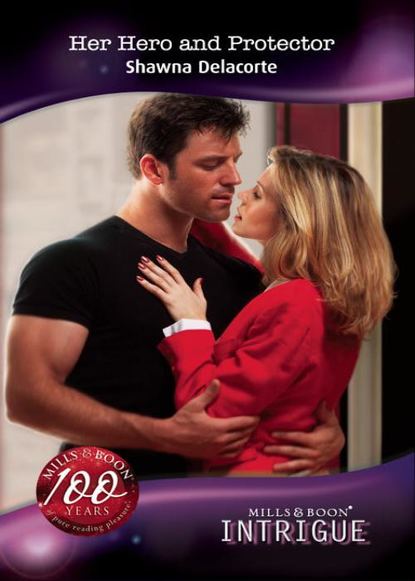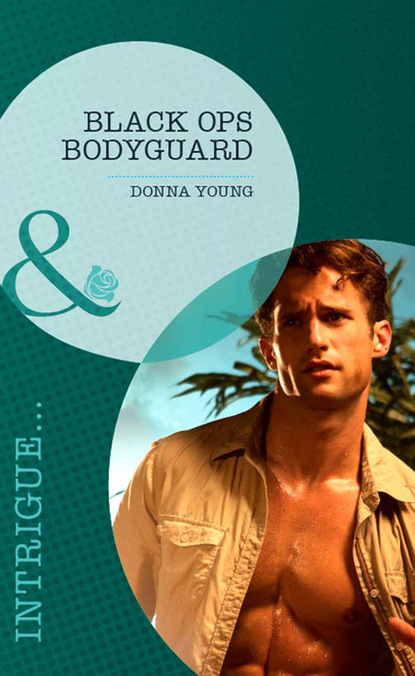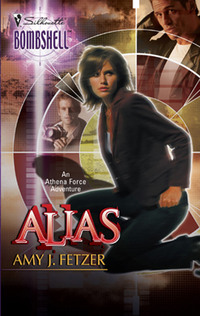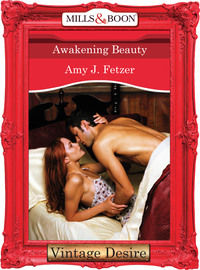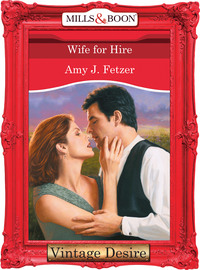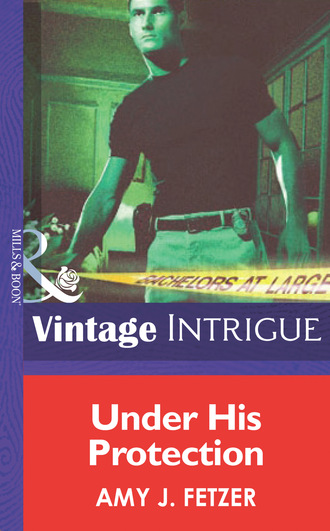
Полная версия
Under His Protection
“He was wearing Brooks khaki slacks, matching socks. A hunter-green, tailored, short-sleeve shirt, pressed and creased. Brown Florsheim shoes and a brown belt.” Good clothing had been an addiction of Peter’s.
Nash made notes in a black leather book. His gaze slid up to meet hers, and for a second his expression softened a fraction. Lisa glimpsed the man she once loved. Then just as quickly that man was gone again.
“Did anyone else know you were going to see him?”
“I might have mentioned it to my staff.” She wiped her eyes again, then threw the wad of tissue into a trash can.
“I’ll need to talk with them.”
Why? she wanted to know, but she didn’t argue. “Free country. They’re adults, not children. I’ll give you their home numbers.” She wrote the information on the back of a business card and handed it to him. He didn’t even glance at it, simply tucked it in his notebook. “Kate’s at the counter now, and Chris doesn’t come in till after his last class. He’s a college student at USC.”
Nash scribbled and she noticed the shorthand. She’d flunked that course.
“What were you wearing at the time you visited your husband?”
“A lime-green skirt and top, matching sandals and purse.”
He arched a brow.
“Matching jewelry, too. Wanna see it?”
“I’ll want to take all of it.”
“What?” Her eyes widened, and the feeling she’d had moments ago landed like a brick against her heart. “You think I had something to do with Peter’s death.”
Nash continued to write.
“Nash Couviyon!”
Still he didn’t comment, then slowly met her gaze again. “I don’t have an opinion yet. We need samples from your things to compare with what forensics finds in the room.”
“You definitely think he was murdered?”
Nash wasn’t ready to say so just yet. “The death of a healthy man is always suspicious.”
“Oh, for the love of Mike,” she said, and the air left her lungs in one shot. “You actually think I had something to do with it?”
Her words drained away any feeling she had, any trust she might have given him. Then the she-cat he remembered and had loved came racing back.
“This meeting is over,” she said.
He strove for patience. “Lisa, I have to look at all the possibilities.”
Her green eyes narrowed to slits. “Look elsewhere, Detective,” she said, and started to rise.
“Sit down!” he snapped.
Lisa lowered herself into the chair again, scowling at him.
“It’s either here or the station, Lisa. Your choice.”
She folded her arms and glared. “Fine. Ask away.”
“Did you carry anything into the room besides your handbag?”
Lisa searched his features. “No, but I had on a scarf.”
Something inside Nash froze. “Describe it please.”
“It was my grandmother’s. It’s pale green with hand-painted irises. It’s the reason I got here so quickly this morning. I was on my way here to get it back.”
“Why did you leave it?”
“I didn’t. It was in my hair, which I had in a ponytail. The scarf was tied around the rubber band to hide it. It must have come undone. It’s silk and slippery.”
Nash wrote, the notebook sliding on the highly polished table. The business card she’d given him showed and he flipped it over.
Lisa thought she saw sadness flicker in his eyes.
“The Enchanted Garden, that’s your business?”
“Yes.” She frowned. “Didn’t you already know that?”
Nash shook his head.
“I started it up about ten months ago. It’s on my land around the house and it’s doing really well.” Her brows knit. “I don’t get it. Your brother Temple buys some of his plants for his landscaping business from me. I thought you knew.”
“I knew he used this nursery, but he never mentioned it was yours.”
“Maybe he thought he was being disloyal to his older brother by doing business with me. I know how you Couviyon brothers stick together.”
“Obviously, Temple has his own set of rules.”
“I know, he’s an outrageous flirt.”
She was trying to ease the tension in the room. But Nash could feel it thicken the air. He tossed the card down and rose, moving to the door and speaking to the officer posted outside, who moved off to do his bidding. Nash waited, glancing back at her only once. She couldn’t have done this, he thought.
“Why didn’t you ever come by to say hello, Nash?”
“I knew you were here, Lisa.” He didn’t look at her. “I didn’t want to open that door again.” It hurt too much, he thought, then realized it still did.
“And saying hello, how’s your mama, would have been torture?”
“Yeah, it would have.”
Lisa’s lips tightened. Well, that said a lot, she thought.
“Why didn’t you come to me?” he asked.
“I was still married.”
Nash simply stared, wondering if she’d been single would they have gotten back together. And in the same moment he remembered that she had dumped him. She’d wanted picket fences and babies, and he couldn’t give her that. Aside from the fact that he’d just taken a bullet in the line of duty and lost his partner, he’d watched the devastation hit the widow and cut a strong woman off at the knees. He couldn’t do that to Lisa.
The officer returned, interrupting his thoughts and handing him two paper bags. Nash moved back to the table and set them on the floor. He reached into one and pulled out a plastic evidence bag.
“Is this your scarf?”
“Yes.” She extended a hand.
He pulled it back. “Evidence.”
“What do you mean, evidence? It’s my scarf.”
“It was found wrapped around the victim’s neck, Lisa.” Her eyes widened, and she went perfectly still. When she sank back into the chair, he asked, “Now do you want to tell me what you argued about?”
“No, I don’t. It was personal.”
Nash backed off for now. “Were you angry when you left here?”
“No, I was just tired, Detective.”
Nash heard the wall go up between them, even if he couldn’t see it. He returned the plastic envelope to the bag. “Do you make teas?”
She blinked, taken aback. “Yes, I do. My herb plants grow quickly in this weather, and I have to cut them back. It’s a waste not to do something with the herbs.”
“And do you sell the teas at your place of business?”
“Not as a regular commodity, no. I use the cuttings for cooking or rooting new plants. Occasionally I make bath teas, scented bath salts, a couple of mint and catnip drinking teas, and I put them in baskets with a live plant. But it’s not a main part of my business, and it’s time-consuming to put them together. So I make them up as requested.”
“The baskets are for regular sale?”
“No, only with the custom orders. They’re handmade, too expensive to make a profit and to keep a reasonable stock of them takes up considerable space.” Lisa glanced at the notes he was furiously writing. “Especially because the humidity can rot them. I run a nursery, not a bath-and-tea shop.”
“Did you bring one of these custom baskets to the hotel or have it delivered?”
Her brows knitted. “No.” Peter would have seen any gift as a peace offering. Heck, she thought, her very presence made him believe she wasn’t going to divorce him, although she’d signed the papers weeks before and it had been only a matter of the time line hitting a specified mark. One that had her in deep trouble right now, she suspected.
“Describe the baskets please.”
Lisa told him what they looked like, but when she described the brass oval engraved with “Enchanted Garden,” he wilted in his chair. She’d bet her best Kamali pumps that a basket just like one of hers was in that larger bag at his feet.
“Did you speak to anyone on your way to the Baylor Inn, and did anyone see you enter and or exit the building?”
That Nash wouldn’t look at her, wouldn’t even acknowledge her with so much as a nod as he wrote, made her bristle. “I don’t recall. At the time I didn’t know I’d need an alibi. Now my husband is dead. My ex-husband. And you’ve all but accused me of his murder.”
“I don’t have enough evidence for charges.”
Something inside her shattered. “We have nothing more to say to each other.” She stood. “Unless it’s with my lawyer present.”
It was on the tip of his tongue to say that, by law, he could hold her for questioning. “I’ll need everything you were wearing last night.”
“Fine. I’ll deliver the clothing to the station within the hour. Are we finished?”
“For now, yes.”
Lisa strode to the door. Before she could open it, Nash was there, his hand over her fist.
Her gaze snapped to his. He could taste her fury, it was so pungent.
“Back off, Detective.”
He didn’t. “Lisa, let’s not start like this.”
She laughed, sharp and bitter. “We aren’t starting a damn thing, Couviyon. We were finished four years ago.” Four years ago when I was pregnant with your child, she thought, knowing that if she’d ever considered telling him the truth, she sure didn’t now.
“You finished it. I didn’t.”
“You were never in the relationship, Nash. You had your own neat version and you kept me on the outside unless we were in bed.” She shook off his hand and jerked opened the door.
“Lisa. This is my job.”
“I’m thrilled for you. Go do it. And until you have something more than accusations, don’t come near me.”
She left, striding past the officers. Nash signaled to let her pass. She was pure anger in a snug skirt and high-heeled sandals.
“Seems like a hostile witness, Detective,” an officer said.
Nash let out a breath. “Oh, yeah.”
Chapter Two
Nash watched Lisa storm off, leaving him feeling twisted and confused. This was why he hadn’t dropped by her place to say hello, he thought. She did things to him no other woman had and he still hurt. The humiliation of being dumped by her hardly compared to the feelings of regret he’d had for months after learning she was six hundred miles away walking down the aisle with another man.
Seeing her today warned him he still wasn’t over her. Just looking into her eyes stung his heart.
Suddenly Quinn stuck his head out of the room, caught a glimpse of Lisa and whistled softly. Then he looked at Nash.
“That Couviyon charm not working today, laddie?”
Nash eyed Quinn. “You knew she was coming here?”
“I heard the supervisor call her. And yes, I also remembered her married name.”
Quinn’s look said Nash had had his head in the sand. Not good for a cop, Nash knew. “She’s divorced officially as of this morning.”
“So she was still the wife when the victim died?”
Any connection between Lisa and the victim was suspect and damaging, Nash thought. “As I recall, the exact time of death is your job, Kilpatrick,” he snarled, pushing past Quinn and into the suite.
Nash ordered a background check on the victim. And his wife.
“Detective?”
Nash rounded, ready to chew someone in two.
A short, wiry man in a black suit stepped into the room. “You couldn’t keep this quiet?” he said, glancing around.
Nash’s breath snapped out of him. Baylor, the owner of the hotel, and he looked pissed. The day was just getting better and better.
“There are other guests, you know, and they want back into their rooms.”
“They will be allowed in soon. And it’s a little hard to hide a suspicious death.”
The man’s eyes were glued to the black body bag rolling away on a stretcher. “Murder?”
Ignoring that, Nash took out his pad, and when he was about to escort Baylor to another room for questioning, the man rushed over to an officer dusting the dresser for prints. “Is that going to leave a stain? This chest is two hundred years old.”
The police officer gave Baylor a once-over, then glanced beyond him to Nash and said, “No sir,” before going back to work.
“Sir?” Nash crooked a finger. “You’re Mr. Will Baylor?”
The man nodded. “William Reese Baylor IV,” he clarified. “I’m the owner. My family built this home over 150 years ago.”
“Nice place,” Nash said, caring little about Baylor’s lineage and the inn’s history. His own family had a plantation, Indigo Run, on the edge of town that had been in operation since 1711. “You met the deceased?”
“Briefly when he checked in two days ago. Very nice man. He kept to himself.”
“Did he meet anyone here?”
“We don’t question our guests so personally. We pride ourselves on privacy, relaxation and discretion.”
Nash’s gaze narrowed dangerously, and the owner folded.
“Not that I know of. But I’m not here twenty-four seven. With the exception of lunch yesterday, I believe he dined in his suite.”
For a man here on business, Winfield didn’t do much, Nash thought. Except meet with Lisa. Winfield’s PalmPilot indicated he had three meetings but gave no names or times, only dates, and though the victim’s laptop was found in the room, they needed a password to access the data.
“How did they get in? Was it someone he knew?” Baylor moved to a set of French doors, but Nash stopped him from opening them, wiggling his own gloved fingers.
“Prints.”
Baylor glanced at the officer still kneeling by the chest of drawers. “Oh, yes, of course. This balcony leads to a separate entrance for this room and the one next door. There’s a staircase, very narrow and steep, leading to the lower floors outside the kitchen and a path to the patio. It was once the servants’ staircase.”
The door had an old-fashioned brass latch, one that you had to wrap your hand around to open. With a pen, Nash tried pushing it. It was locked from the inside. But that didn’t mean someone couldn’t have come up here and left this way. Checking that it had been already dusted, Nash opened it, careful not to step on the porch. Earlier, officers had canvassed the area, and it was going to take some manpower to see if anyone had noticed someone entering the suite through this door. He looked down, then squatted. They hadn’t had rain in a while, and the dust level was high. There were several shoe prints in the dust outside the door, and although they’d been lifted and logged already, there were two smaller sets. A woman’s?
Nash rubbed his face and straightened. “Who sent the basket?”
The owner frowned and Nash produced the sweet-grass basket with Lisa’s logo on the rim.
“I don’t know. It’s not something we ordered. We provide toiletries for our guests and we have better taste than to offer homemade items.” Baylor made a face at the basket. “We do seasonal fruit and flavored coffees, too.” He pointed to the silver tray on a stand near the windows. An officer was collecting it.
Nash stared at the basket. Most of it wasn’t homemade, and he wondered again about the teabag-shaped thing dangling from the bathtub faucet.
Another officer stripped the fitted sheet and quilt from the bed.
“No, no, no, that quilt is mine,” Baylor said.
Nash touched his arm. “It’s evidence. It’ll be returned to you.”
“It’s a hundred years old and in perfect condition, and it had better come back to me that way.” The odors hit Baylor and he blanched a bit. Death hung in the air like a vapor.
“If it’s so precious, why is it displayed on a bed?”
Baylor sniffed. “Ambiance.”
Nash suppressed the urge to roll his eyes. “Take that up with forensics.” He handed him a card.
Baylor snatched it as if snatching the quilt, then looked around at his eighteenth-century-decorated suite. Nash saw him droop with disappointment.
“I’m not going to be able to rent this room for a while,” he said disparagingly.
“We’ll let you know when we’re done with it.”
“That’s not what I mean. Who’d want to stay here?”
“People die every day.”
Boarding-school posture gripped Baylor’s spine. “Not in my inn.”
Death was tough for most people. For Nash, it was his career. He spoke for the dead, investigated for them. And he had compassion for the people left behind. But Baylor was more concerned with hotel profits than the fact of a guest’s death. Takes all kinds, Nash thought.
“I need a list of who had access to this room. Everyone who has a master key to both doors and who was on duty for the past week.”
Baylor nodded.
Nash stared. “Today.”
Baylor’s expression held more than one man’s share of exasperation.
Nash added to it. “I’d like to speak to the staff, too.”
“Now? They’re busy with guests.”
Nash kept writing in his notepad, not looking up. “You know, Mr. Baylor, I’m getting the sense that you don’t want us to find out what happened.”
“Of course I do. It could have been an accident— maybe he banged his head in the tub or something.”
Nash’s brows drew together. How did this man know the victim was found wearing only a towel and the bathtub was full of water? Or was he just worried that if that was the case, the family would sue? “Where were you between 5:00 p.m. yesterday and this morning, Mr. Baylor?”
If the victim had been dead nine hours, then Nash had to narrow the suspect list.
Baylor gave Nash a look that said he thought himself beyond reproach. “I’ll give you my schedule. Follow me, and I’ll introduce you to the concierge.”
THE CONCIERGE, John Chartres, was a tall, narrow man with equally confined features, and for someone living in a southern seaboard town, he was as pale as the white shirt beneath his tailored suit. His black hair was swept back with a severity that sharpened his face and made his eyes and lips look vibrant against his skin. He wore disdain like a tie, and he rose from behind the delicate desk like a king from his throne. Oh, yeah, that says welcome to the Baylor real well, Nash thought cynically.
Then the man spoke and the New York accent, however he tried to hide it, hurt Nash’s ears.
“I didn’t see anyone go to his suite specifically. Perhaps you should question the housekeeping staff. I’m usually in my office.”
“Isn’t it your job to know all the guests? To see that their stay is perfect?”
“I delegate well.”
I’ll bet. And actually working your job was for the little people, Nash thought. “Did you know Mr. Winfield?”
“Other than his face and name, no. He was only a guest.”
Nash kept his features relaxed, but that the man kept shuffling through papers and not looking him in the eye said he was hiding something. Nash would have to dig a little with this one.
“You have a key to the door to the back staircase?”
“I have a key to every door in this hotel.”
“I’ll need a list of which keys each employee carries and where they are kept.”
Chartres gestured and Nash followed the man into the reception area and behind the counter.
Nash’s gaze swept the rows of keys. “You’re kidding, right? Anyone could take these.” The keys weren’t the computer-card type but old-fashioned brass, which he was sure added the same sort of ambiance as the antique quilt.
“Each room has inside locks, as well, and though they look old, they aren’t.” Chartres handed a key over.
It was chiseled like a house key, but the tab was brass with Victorian scroll.
“The balcony doors have no outside handles,” Chartres said, then explained, “The staff doesn’t use it. Though it’s sturdy, in keeping with the historical accuracy, the staircase remains steep and narrow. We discourage guests from opening the doors unless they are in residence. There is a push latch in case the door closes, but the inside lock must be disengaged.”
So, Nash thought, if anyone came into the room from that direction, the guest had to be expecting them and the locks had to be disengaged. The balcony doors had been locked from the inside when the police had arrived. Had Winfield opened them for his killer? Or his ex-wife? Even as the thought careened through his head, Nash hated himself for it. Lisa was not capable of murder. Not the Lisa he once knew.
“You said you were on duty?” Nash asked.
“Yes. And if you don’t mind, can we take this back into my office?”
As they headed in that direction, Chartres lagged behind, smiling at an elderly couple approaching the reception area. He slipped behind the gleaming counter to retrieve a few slips of paper, handing them to the couple. “Your phone messages,” Chartres said to them. “And your 7:00 p.m. reservations at Emily’s are set.”
Nash had to admit that when Chartres was talking with the hotel patrons, he was all smiles and warmth. The couple inquired about the police cars and ambulance, and Chartres explained that a guest had passed away during the night and for them not to worry. But then Nash shouldered his way past, introduced himself and questioned the elderly couple. It gained him nothing. Though their rooms were on the floor below, they insisted they were sound sleepers.
Chartres gestured to the office. “That was rude, Detective.”
“A policeman’s job is often rude. Everyone is a potential witness.” Nash’s look said the concierge was on that list, and Chartres stiffened, affronted. “At what time did you leave your post?” Nash asked once they were in the small office.
“I didn’t.”
“Not to eat, not to use the bathroom?”
“No. Meals are brought here, if I want. And I didn’t.”
“You didn’t make the rounds during the cocktail and dinner hour?”
“No.”
Then who’s to say he was even in the office? Nash thought. “You have a popular restaurant in this hotel, Mr. Chartres. You didn’t leave your office and stroll through, introducing yourself?”
“It was a quiet night.”
“Quiet enough not to notice someone heading up to Mr. Winfield’s room?”
“Apparently. This hotel is more like a home, the atmosphere unobstructed. It’s why we do so well. Not all the suites are occupied, anyway. We don’t check on the comings and goings of guests, only that while they’re here, they’re happy.”
“You had a delivery to a room, yet no one seems to recall receiving it.”
“What delivery?
“A basket from Enchanted Garden.”
“It may have been a gift from someone. All deliveries are signed for and recorded.” Chartres swiveled his chair toward a computer screen and tapped the keys. He peered. “The only deliveries were the daily flowers for the rooms, a guest’s dry cleaning and a package from High Cotton for the elderly couple you saw, which was placed in their room.”
That high-school class in shorthand came in handy sometimes, Nash thought as Chartres tried to sneak peeks at his notes. After a few more questions, Chartres printed out a list of the staff and phone numbers and a schedule roster. Nash folded it into his leather notebook, then stood, offering his hand. Chartres’s palm was smooth and dry, his grip firm.
Nash left, heading back upstairs again to check the outer doors. Officers were almost finished with the room and had double-checked outside for footprints. Nash opened the door and studied the deck, the path down to the first and second floors. He wondered if Baylor had the floor plans to this place and walked across the balcony and down the stairs. A private home was tucked only yards away, beside the hotel, and a privacy fence carved a smart line between the properties. The inn dining room was to the rear, a sizable portion of seating outdoors on a stone patio surrounded by exotic flowering shrubs and shaded with umbrellas. It was empty now.
Nash climbed back up the stairs to look around the suite once more. Was the scarf the murder weapon? If not, Winfield could have died from anything, food poisoning or heart trouble. Until he had an autopsy, Nash was finished here. He’d collect reports from the other officers, run a check on Winfield, and then he’d know where to go from there. At the moment there was too little evidence to point him in any direction.
Except at Lisa.
He was done for now, anyway, he reasoned and returned to his office, dropping into his chair and tossing his notebook on the desk. He dug the heels of his palms into his eyes, then sagged back into the chair. A bag of clothing marked “Lisa Bracket Winfield” was sealed and on his desk. A note from the sheriff said she’d offered prints before they’d asked. Her angry expression flashed like lightning in his mind. He could have handled that confrontation better, he thought. He knew he hadn’t accused her of the crime, but the questions always made people defensive. But what the hell was she hiding?


